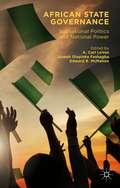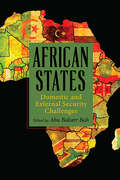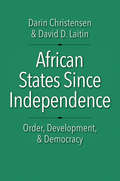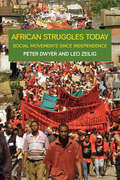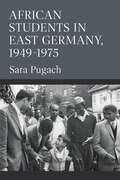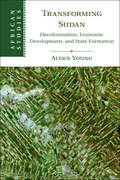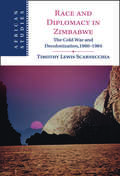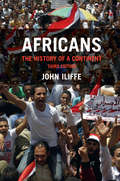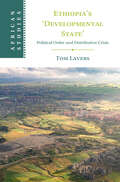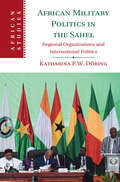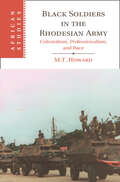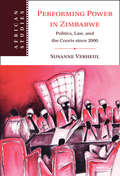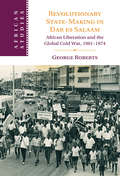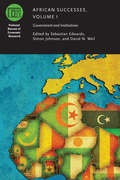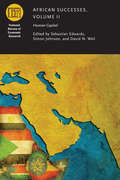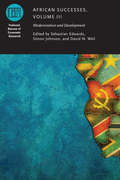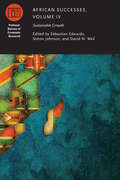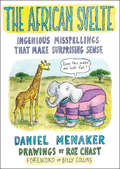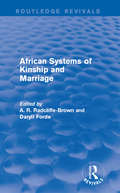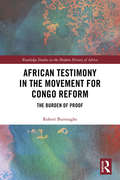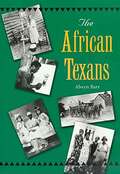- Table View
- List View
African State Governance: Subnational Politics And National Power
by Edward R. McMahon Joseph Olayinka Fashagba A. Carl LeVanAfrica is changing and it is easy to overlook how decentralization, democratization, and new forms of illiberalism have transformed federalism, political parties, and local politics. Chapters on Kenya, Nigeria, Ethiopia, and South Africa help fill an important gap in comparative institutional research about state and local politics in Africa.
African States: Domestic and External Security Challenges (SUNY series, James N. Rosenau series in Global Politics)
by Abu Bakarr BahEssays on the security challenges faced by African states.The central concern that shapes this edited volume is the nature of the African state. Contributors point to an interesting intersection of domestic and external issues that is framed as a glocalized security situation. Individual chapters shed new insights on conflict drivers through case studies on Sierra Leone, Cameroon, Mali, Nigeria, and Somalia, as well as broader issues on the nature of African states. Arguments pivot on three issues, which show the intersection of the domestic and external forces that render the African state as a glocal problem: (a) the colonial roots of the state, (b) problems of governance, and (c) international and regional security imperatives. By problematizing the African state and connecting the security challenges of African states to colonialism, patrimonial rule, and geopolitical security issues, African States brings forth a new way of examining African states through the notion of glocalized security.
African States since Independence: Order, Development, and Democracy (Castle Lecture Series)
by Darin Christensen David D. LaitinAuthors Christensen and Laitin argue that an interplay of geographic, historical, and demographic factors undergird sub‑Saharan states’ post‑independence struggles to eradicate poverty, establish democratic accountability, and quell civil unrest. They set out the founding fathers’ challenges in transforming their postcolonial states, many of which are ethnically diverse, geographically diffuse, sparsely populated, and lacking in administrative capacity. With the legacies of the slave trade, partition, Christian missionaries, and extractive colonial institutions complicating their efforts, many African states faced stagnation, authoritarianism, and civil strife. Recent years have seen promising attempts to restore democracy to states under authoritarian rule and to liberalize their economies, suggesting that the region is moving toward a new era. Relying on the best statistical data and richly illustrated with case material, this book is an indispensable source for scholars and policy analysts seeking to understand Africa’s post‑independence political trajectories.
African Struggles Today
by Leo Zeilig Peter DwyerThree leading Africa scholars investigate the social forces driving the democratic transformation of postcolonial states across southern Africa. Extensive research and interviews with civil society organizers in Zimbabwe, South Africa, Zambia, Malawi, Namibia, and Swaziland inform this analysis of the challenges faced by non-governmental organizations in relating both to the attendant inequality of globalization and to grassroots struggles for social justice.Peter Dwyer is a tutor in economics at Ruskin College in Oxford.Leo Zeilig Lecturer at the Institute of Commonwealth Studies, University of London.
African Students in East Germany, 1949-1975 (Social History, Popular Culture, And Politics In Germany)
by Sara PugachThis book explores the largely unexamined history of Africans who lived, studied, and worked in the German Democratic Republic. African students started coming to the East in 1951 as invited guests who were offered scholarships by the East German government to prepare them for primarily technical and scientific careers once they returned home to their own countries. Drawn from previously unexplored archives in Germany, Ghana, Kenya, Zambia, and the United Kingdom, African Students in East Germany, 1949–1975 uncovers individual stories and reconstructs the pathways that African students took in their journeys to the GDR and what happened once they got there. The book places these experiences within the larger context of German history, questioning how ideas of African racial difference that developed from the eighteenth through the early twentieth centuries impacted East German attitudes toward the students. The book additionally situates African experiences in the overlapping contexts of the Cold War and decolonization. During this time, nations across the Western and Soviet blocs were inviting Africans to attend universities and vocational schools as part of a drive to offer development aid to newly independent countries and encourage them to side with either the United States or Soviet Union in the Cold War. African leaders recognized their significance to both Soviet and American blocs, and played on the desire of each to bring newly independent nations into their folds. Students also recognized their importance to Cold War competition, and used it to make demands of the East German state. The book is thus located at the juncture of many different histories, including those of modern Germany, modern Africa, the Global Cold War, and decolonization.
African Studies: Political Thought and the Public Sphere in Tanzania
by Emma HunterPolitical Thought and the Public Sphere in Tanzania is a study of the interplay of vernacular and global languages of politics in the era of decolonization in Africa. Decolonization is often understood as a moment when Western forms of political order were imposed on non-Western societies, but this book draws attention instead to debates over universal questions about the nature of politics, concept of freedom and the meaning of citizenship. These debates generated political narratives that were formed in dialogue with both global discourses and local political arguments. The United Nations Trusteeship Territory of Tanganyika, now mainland Tanzania, serves as a compelling example of these processes. Starting in 1945 and culminating with the Arusha Declaration of 1967, Emma Hunter explores political argument in Tanzania's public sphere to show how political narratives succeeded when they managed to combine promises of freedom with new forms of belonging at local and national level.
African Studies: Political Identity and Conflict in Central Angola, 1975–2002
by Justin PearceThis book examines the internal politics of the war that divided Angola for more than a quarter-century after its independence. It emphasises the Angolan people's relationship to the rival political forces that prevented the development of a united nation, an aspect of the conflict that has received little attention in earlier studies. Drawing upon interviews with farmers, town dwellers, soldiers and politicians in Central Angola, Justin Pearce examines the ideologies about nation and state that elites deployed in pursuit of hegemony and traces how people responded to these attempts at politicisation. The book not only demonstrates the potency of the rival conceptions of state and nation in shaping perceptions of self-interest and determining political loyalty, but also shows the ways in which allegiances could and did change for much of the Angolan population in response to the experience of military force.
African Studies: National Liberation in Postcolonial Southern Africa
by Christian A. WilliamsThis book traces the South West Africa People's Organization (SWAPO) across its three decades in exile through rich, local histories of the camps where Namibian exiles lived in Tanzania, Zambia, and Angola. Christian A. Williams highlights how different Namibians experienced these sites, as well as the tensions that developed within SWAPO as Namibians encountered one another and as officials asserted their power and protected their interests within a national community. The book then follows Namibians who lived in exile into post-colonial Namibia, examining the extent to which divisions and hierarchies that emerged in the camps continue to shape how Namibians relate to one another today, undermining the more just and humane society that many had imagined. In developing these points about SWAPO, the book draws attention to Southern African literature more widely, suggesting parallels across the region and defining a field of study that examines post-colonial Africa through 'the camp'.
African Studies: Decolonization, Economic Development, and State Formation (African Studies #140)
by Alden YoungFollowing the conclusion of the Second World War, the nature of inequality in Africa was dramatically altered. In this book, Alden Young traces the emergence of economic developmentalism as the ideology of the Sudanese state in the decolonization era. Young demonstrates how the state was transformed, as a result of the international circulation of tools of economic management and the practice of economic diplomacy, from the management of a collection of distinct populations, to the management of a national economy based on individual equality. By studying the hope and eventual disillusionment this ideology gave to late colonial officials and then Sudanese politicians and policymakers, Young demonstrates its rise, and also its shortfalls as a political project in Sudan, particularly its inability to deal with questions of regional and racial equity, not only showing how it fostered state formation, but also civil war.
African Studies: The Cold War and Decolonization,1960–1984
by Timothy Lewis Scarnecchia<p>The 'Rhodesian crisis' of the 1960s and 1970s, and the early 1980s crisis of independent Zimbabwe, can be understood against the background of Cold War historical transformations brought on by, among other things, African decolonization in the 1960s; the failure of American power in Vietnam and the rise of Third World political power at the UN and elsewhere. In this African history of the diplomacy of decolonization in Zimbabwe, Timothy Lewis Scarnecchia examines the relationship and rivalry between Joshua Nkomo and Robert Mugabe over many years of diplomacy, and how both leaders took advantage of Cold War racialized thinking about what Zimbabwe should be, including Anglo-American preoccupations with keeping whites from leaving after Independence. Based on a wealth of archival source materials, including materials that have recently become available through thirty-year rules in the UK and South Africa, it uncovers how foreign relations bureaucracies the US, UK, and SA created a Cold War 'race state' notion of Zimbabwe that permitted them to rationalize Mugabe's state crimes in return for Cold War loyalty to Western powers.</p>
African Studies Series: The History of a Continent (African Studies #137)
by John IliffeIn a vast and all-embracing study of Africa, from the origins of mankind to the AIDS epidemic, John Iliffe refocuses its history on the peopling of an environmentally hostile continent. Africans have been pioneers struggling against disease and nature, and their social, economic and political institutions have been designed to ensure their survival. In the context of medical progress and other twentieth-century innovations, however, the same institutions have bred the most rapid population growth the world has ever seen. Africans: The History of a Continent is thus a single story binding living Africans to their earliest human ancestors.
African Studies Series: Political Order And Distributive Crisis (African Studies #Series Number 168)
by Tom LaversAfrican Studies Series: Politics, Law, And The Courts Since 2000 (African Studies #Series Number 155)
by Susanne Verheul<p>Focusing on political trials in Zimbabwe's Magistrates' Courts between 2000 and 2012, Susanne Verheul explores why the judiciary have remained a central site of contestation in post-independence Zimbabwe. Drawing on rich court observations and in-depth interviews, this book foregrounds law's potential to reproduce or transform social and political power through the narrative, material, and sensory dimensions of courtroom performances. Instead of viewing appeals to law as acts of resistance by marginalised orders for inclusion in dominant modes of rule, Susanne Verheul argues that it was not recognition by but of this formal, rule-bound ordering, and the form of citizenship it stood for, that was at stake in performative legal engagements. In this manner, law was much more than a mere instrument. Law was a site in which competing conceptions of political authority were given expression, and in which people's understandings of themselves as citizens were formed and performed.</p>
African Studies Series: African Liberation and the Global Cold War, 1961–1974 (African Studies Book 156)
by George Roberts<p>Tracing Dar es Salaam's rise and fall as an epicentre of Third World revolution, George Roberts explores the connections between the global Cold War, African liberation struggles, and Tanzania's efforts to build a socialist state. Instead of understanding decolonisation through a national lens, he locates the intersection of these dynamics in a globally-connected city in East Africa. Revolutionary State-Making in Dar es Salaam introduces a vibrant cast of politicians, guerrilla leaders, diplomats, journalists, and intellectuals whose trajectories collided in the city. In its cosmopolitan and rumour-filled hotel bars, embassy receptions, and newspaper offices, they grappled with challenges of remaking a world after empire. Yet Dar es Salaam's role on the frontline of the African revolution and its provocative stance towards global geopolitics came at considerable cost. Roberts explains how Tanzania's strident anti-imperialism ultimately drove an authoritarian turn in its socialist project and tighter control over the city's public sphere.</p>
African Successes, Volume I: Government and Institutions
by Sebastian Edwards David N. Weil Simon JohnsonStudies of African economic development frequently focus on the daunting challenges the continent faces. From recurrent crises to ethnic conflicts and long-standing corruption, a raft of deep-rooted problems has led many to regard the continent as facing many hurdles to raise living standards. Yet Africa has made considerable progress in the past decade, with a GDP growth rate exceeding five percent in some regions. The African Successes series looks at recent improvements in living standards and other measures of development in many African countries with an eye toward identifying what shaped them and the extent to which lessons learned are transferable and can guide policy in other nations and at the international level. The first volume in the series, African Successes: Governments and Institutions considers the role governments and institutions have played in recent developments and identifies the factors that enable economists to predict the way institutions will function.
African Successes, Volume II: Human Capital
by David N. Weil Sebastian Edwards Simon JohnsonStudies of African economic development frequently focus on the daunting challenges the continent faces. From recurrent crises to ethnic conflicts and long-standing corruption, a raft of deep-rooted problems has led many to regard the continent as facing many hurdles to raise living standards. Yet Africa has made considerable progress in the past decade, with a GDP growth rate exceeding five percent in some regions. The African Successes series looks at recent improvements in living standards and other measures of development in many African countries with an eye toward identifying what shaped them and the extent to which lessons learned are transferable and can guide policy in other nations and at the international level. The second volume in the series, African Successes: Human Capital turns the focus toward Africa's human capital deficit, measured in terms of health and schooling. It offers a close look at the continent's biggest challenges, including tropical disease and the spread of HIV.
African Successes, Volume III: Modernization and Development
by David N. Weil Sebastian Edwards Simon JohnsonStudies of African economic development frequently focus on the daunting challenges the continent faces. From recurrent crises to ethnic conflicts and long-standing corruption, a raft of deep-rooted problems has led many to regard the continent as facing many hurdles to raise living standards. Yet Africa has made considerable progress in the past decade, with a GDP growth rate exceeding five percent in some regions. The African Successes series looks at recent improvements in living standards and other measures of development in many African countries with an eye toward identifying what shaped them and the extent to which lessons learned are transferable and can guide policy in other nations and at the international level. The third volume in the series, African Successes: Modernization and Development looks at the rise in private production in spite of difficult institutional and physical environments. The volume emphasizes the ways that technologies, including mobile phones, have made growth in some areas especially dynamic.
African Successes, Volume IV: Sustainable Growth
by David N. Weil Sebastian Edwards Simon JohnsonStudies of African economic development frequently focus on the daunting challenges the continent faces. From recurrent crises to ethnic conflicts and long-standing corruption, a raft of deep-rooted problems has led many to regard the continent as facing many hurdles to raise living standards. Yet Africa has made considerable progress in the past decade, with a GDP growth rate exceeding five percent in some regions. The African Successes series looks at recent improvements in living standards and other measures of development in many African countries with an eye toward identifying what shaped them and the extent to which lessons learned are transferable and can guide policy in other nations and at the international level. The fourth volume in the series, African Successes: Sustainable Growth combines informative case studies with careful empirical analysis to consider the prospects for future African growth.
The African Svelte: Ingenious Misspellings That Make Surprising Sense
by Daniel Menaker&“For language lovers, this book, with all its verbal tangles and wit, is sure to, in its own words, &‘pass mustard&’&” (Poets & Writers). Inspired by Daniel Menaker&’s tenure at the New Yorker, this collection of comical, revelatory errors foraged from the wilds of everyday English comes with commentary by the author, illustrations by Roz Chast, and a foreword from Billy Collins. During his time at the renowned magazine, Menaker happened across a superb spelling mistake: &“The zebras were grazing on the African svelte.&” Fascinated by the idea of unintentionally meaningful spelling errors, he began to see that these gaffes—neither typos nor auto-corrects—are sometimes more interesting than their straight-laced counterparts. Through examples he has collected over the course of his decades-long career as an editor and writer, he brings us to a new understanding of language—how it&’s used, what it means, and what fun it can be. Illustrated by the inimitable Roz Chast, with a foreword by former poet laureate Billy Collins, The African Svelte offers thoughtful and intelligent exit Jesus. With both uniquely happy accidents and familiar fumbles like &“for all intensive purposes&” and &“doggy-dog world,&” readers delighted by language will find themselves turning the pages with baited breath to discover fresh howlers that have them laughing off their dairy airs.
African Swine Fever Virus: Methods and Protocols (Methods in Molecular Biology #2503)
by Christopher L. NethertonThis volume provides a compilation of methods that will aid researchers studying virology, immunology, and vaccinology of this devastating disease of swine. Written in the format of the highly successful Methods in Molecular Biology series, each chapter includes an introduction to the topic, lists necessary materials and reagents, includes tips on troubleshooting and known pitfalls, and step-by-step, readily reproducible protocols. Authoritative and cutting-edge, African Swine Fever Virus: Methods and Protocols aims to be a foundation for future studies and to be a source of inspiration for new investigations in the field.
African Systems of Kinship and Marriage (Routledge Revivals)
by A. R. Radcliffe-Brown Daryll FordeFirst published in 1950 and this edition in 1987, this book is one of the most wide-ranging and respected surveys on kinship and marriage in African social life. In his introduction, Radcliff-Brown provides a masterly analysis of the main features of African kinship systems and the theoretical problems arising from the study of them. The contributions range from examinations of kinship systems among the Swazi, the Tswana, the Zulu, the Nuer, and the Ashanti, to double descent among the Yakö and dual descent in the Nuba groups of the Sudan. The contributors themselves are still viewed as giants in their field: Evans-Pritchard, Meyer Fortes, Max Gluckman, Hilda Kuper, Naderl, A. I. Richards, Schapera and Monica Wilson.
African Testimony in the Movement for Congo Reform: The Burden of Proof (Routledge Studies in the Modern History of Africa)
by Robert BurroughsThe humanitarian movement against Leopold’s violent colonisation of the Congo emerged out of Europe, but it depended at every turn on African input. Individuals and groups from throughout the upper Congo River basin undertook journeys of daring and self-sacrifice to provide evidence of atrocities for the colonial authorities, missionaries, and international investigators. Combining archive research with attention to recent debates on the relation between imperialism and humanitarianism, on trauma, witnessing and postcolonial studies, and on the recovery of colonial archives, this book examines the conditions in which colonised peoples were able to speak about their subjection, and those in which attempts at testimony were thwarted. Robert Burroughs makes a major intervention by identifying African agency and input as a key factor in the Congo atrocities debate. This is an important and unique book in African history, imperial and colonial history, and humanitarian history.
The African Texans
by Alwyn BarrImmigrants of African descent have come to Texas in waves—first as free blacks seeking economic and social opportunity under the Spanish and Mexican governments, then as enslaved people who came with settlers from the deep South. Then after the Civil War, a new wave of immigration began. In The African Texans, author Alwyn Barr considers each era, giving readers a clear sense of the challenges that faced African Texans and the social and cultural contributions that they have made in the Lone Star State. With wonderful photographs and first-hand accounts, this book expands readers’ understanding of African American history in Texas. Special features include · 59 illustrations · 12 biographical sketches · excerpts from newspaper articles · excerpts from court rulings The African Texans is part of a five-volume set from the Institute of Texan Cultures. The entire set, entitled Texans All, explores the social and cultural contributions made by five distinctive cultural groups that already existed in Texas prior to its statehood or that came to Texas in the early twentieth century: The Indian Texans, The Mexican Texans, The European Texans, The African Texans, and The Asian Texans.
